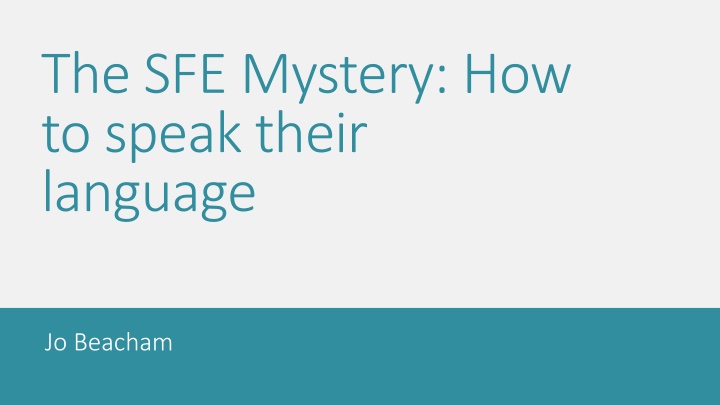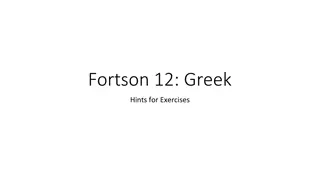Mastering NT Greek Vocabulary Builder Unit 7: Erasmian or Seminary Type Pronunciations
The Vocabulary Builder for Unit 7 of Mastering NT Greek focuses on Erasmian or Seminary Type Pronunciations. The unit covers Greek-to-English and English-to-Greek translations, with a focus on essential vocabulary related to different contexts. Each word is presented with its pronunciation and meaning, aiding learners in enhancing their understanding and fluency in Biblical Greek. Engage with the unit by clicking on the screen to view translated words, using Next/Previous buttons to navigate, and returning to the beginning by clicking on the titles. Explore and learn effectively with this comprehensive tool.
Uploaded on Mar 01, 2025 | 0 Views
Download Presentation

Please find below an Image/Link to download the presentation.
The content on the website is provided AS IS for your information and personal use only. It may not be sold, licensed, or shared on other websites without obtaining consent from the author.If you encounter any issues during the download, it is possible that the publisher has removed the file from their server.
You are allowed to download the files provided on this website for personal or commercial use, subject to the condition that they are used lawfully. All files are the property of their respective owners.
The content on the website is provided AS IS for your information and personal use only. It may not be sold, licensed, or shared on other websites without obtaining consent from the author.
E N D
Presentation Transcript
The SFE Mystery: How to speak their language Jo Beacham
I have been working in the DSA Sector since 2013 as a Needs Assessor, Centre Manager and Service Director. I currently centre manage 16 DSA Assessment Centres for Access2Learn, coordinate the Central Administration Team, Quality Assurance Staff, and a team of over 25 Needs Assessors across England. We primarily see students from Student Finance England, but will also assess Student Finance Wales, Student Finance Northern Ireland, and SAAS. Over this time, I also conduct assessments within the workplace to identify Assistive Technology, and reasonable adjustment recommendations. A little bit about me
16 Assessment Centre Across the UK www.access2learn.co.uk/centres/ Basingstoke Brighton Falmer Brighton Hollingdean Cambridge Chelmsford Falmouth Huddersfield London Access2Learn Manchester Newcastle Nottingham Oxford Plymouth Sheffield Southampton Wolverhampton First Assessment was conducted in May 2016 Since that time, we have now expanded to the 2ndLargest DSA Needs Assessment Provider by volume of centres, and we are still growing
We have conducted over 4000 needs assessments in that time Despite being a very young company, our staff base have been working in DSA for much longer We run with 7 Full Time members of staff based in Edinburgh, London, Southampton and Essex www.access2learn.co.uk/aboutus Over 25 Freelance Needs Assessors based across the UK working out of all of our centres Bespoke self-build database to track all student records, interactions, queries, report and KPI Data
SFE Application Numbers SFE Application Numbers DSA Applications Rec d DSA Applications Rec d Eligible at DSA1 Stage Eligible at DSA1 Stage Ineligible at DSA1 Stage Ineligible at DSA1 Stage Pended at DSA1 Stage Pended at DSA1 Stage DSA2 Status Recorded DSA2 Status Recorded 2017/18 2017/18 Full Full 81,094 61,059 (75%) 14,835 (18%) 5,200 (7%) 43,693 (up to 23/04/03/2019) (up to 23/04/03/2019) 2017/18 2017/18 Comparison Comparison (up to 23/04/2018) (up to 23/04/2018) 76,823 58,912 (77%) 13,836 (18%) 4,075 (5%) 37,564 2018/19 2018/19 Full Full 97,806 62,814 (64%) 15,581 (16%) 19,396 (20%) 43,269 (up to 23/04/2019) (up to 23/04/2019) 2019/20 2019/20 Full Full 18,372 3,982 (22%) 305 (1%) 14,085 (77%) 740 (up to 23/04/2019) (up to 23/04/2019) *Data Source: SFE
SFE Student Disability Category 5.89% 34.98% LEARNING DIFFICULTY 14.35% MENTAL HEALTH MULTIPLE DISABILITIES LONGSTANDING ILLNESS AUTISTIC DISORDER DEAF/PARTIAL HEARING BLIND/PARTIAL SIGHT WHEELCHAIR/MOBILITY 18.11% 21.16% *Data Source: SFE
How many SFE Students studied full time courses at Scottish Universities for the academic year 2017/18?: Universities for the academic year 2017/18?: For the academic year 2017/18 Students how many applied for Tuition Funding from Student Finance England: A. 4,360 B. 9,822 C. 12,480 It s C 12,480 *Data sourced: https://www.slc.co.uk/official-statistics/financial-support-awarded/england-higher-education.aspx
How many of those students who applied were approved for DSA Funding? For the academic year 2017/2018 A. 92 B. 490 C. 687 It s C 687 *Data source: Freedom of information request to SLC
SFE Funded Students at Scottish Higher Education Providers in Receipt of DSA - AY 2017/18 Provider Name ABERTAY UNIVERSITY EDINBURGH NAPIER UNIVERSITY GLASGOW CALEDONIAN UNIVERSITY GLASGOW SCHOOL OF ART HERIOT-WATT UNIVERSITY QUEEN MARGARET UNIVERSITY ROYAL CONSERVATOIRE OF SCOTLAND SCOTLAND'S RURAL COLLEGE ST ANDREWS UNIVERSITY THE ROBERT GORDON UNIVERSITY UNIVERSITY OF ABERDEEN UNIVERSITY OF DUNDEE UNIVERSITY OF EDINBURGH UNIVERSITY OF GLASGOW UNIVERSITY OF STIRLING UNIVERSITY OF STRATHCLYDE UNIVERSITY OF THE HIGHLANDS AND ISLANDS UNIVERSITY OF THE WEST OF SCOTLAND HE Providers with less than 5 students in receipt of DSA Total No of DSA Recipients [1][2] 7 16 7 44 35 16 19 5 93 11 37 24 201 104 48 5 5 8 2 687 Notes: [1] Part Time, Full Time and Postgraduate DSA. [2] Will include a small number of students who applied for DSA only. *Data source: Freedom of information request to SLC
SFE Reports & Recommendations
Restricted Items Book Allowance Internet Allowance The DSA Bundle laptop stand, keyboard, mouse each item now needs a disability related justification for provision. Students can now choose from either a rucksack or shoulder bag for the laptop only Colorimetry Testing Coloured Overlays/Reading Rulers Separate Scanning and Printing Devices it is expected that students can use a combined printer scanner unit Band 1 & 2 Non-Medical Help Support
SFE STANDARD QUERY CATEGORIES FOR REPORTS Printer/Scanners Printing General Allowance Audio Capture Travel Recommendations High Value Computers specifically lightweight and Macbooks Wireless Devices
Printing Recommendations What do I need to ensure is covered within the recommendation in the What do I need to ensure is covered within the recommendation in the needs assessment report to remove any queries from SFE? needs assessment report to remove any queries from SFE? All recommendations for devices for printing and/or scanning must include full justification and evidence setting out why the provision of the item is required for the student to undertake their course solely due to their disability. Assessors should clearly evidence the need for hard copy materials and how that need is additional to that experienced by a non-disabled student. Assessors should also evidence why that additional need cannot be met through the institution s services e.g. library services or reasonable adjustments.
Example Recommendation Text Covering the Requirements - Printing Printer and printing consumables fund: Printer and printing consumables fund: this will enable STUDENT to use visual learning strategies (e.g. highlighting; annotation) when conducting research, which s/he has found to be effective in helping him/her to maintain focus, and as an aid to the breaking down and processing of information. This printing activity will need to take place on demand, in the home, as and when dictated by patterns of research activity. Library services cannot sufficiently meet the need, as reliance on library services would present a practical and logistical barrier to STUDENT research activity. This is not a problem experienced by non-disabled students, and would fundamentally disadvantage STUDENT, hindering rather than facilitating effective research activity. Furthermore, the nature of the required strategy informs that the need cannot be met by the HEP via other reasonable adjustments.
Audio Capture Recommendations What do I need to ensure is covered within the recommendation in the What do I need to ensure is covered within the recommendation in the needs assessment report to remove any queries from SFE? needs assessment report to remove any queries from SFE? Is lecture capture available within the HEI? If it is, then why is it not suitable? If you are wanting to recommend a DVR you need to further cover off: Does the student have access to their own device? Why is this device not suitable?
Example Recommendation Text Covering the Requirements Audio Capture In this example the recommendation is for a separate recording device either Samson Go Mic, or DVR with additional software. STUDENT was presented with a wide range of strategic pathways during the assessment: Typing notes and recording audio using laptop software Writing notes by hand notes while recording linked lecture audio using a smartpen Recording audio while handwriting contextual notes and recording times directly on to printed slides, using a digital voice recorder or smartphone app The recommended strategy has been identified as the pathway that is most suitable for STUDENT. While *HEI* has the technology in place to record lectures internally, this is not in widespread use, and is not available in all teaching environments. STUDENT owns a smartphone, but issues with recording quality, battery life, and interruption of phone calls render this unsuitable as a personal recording device. These problems can be mitigated by use of additional peripherals (microphone; 3.5mm phono headphone/mic splitter cable; Belkin Rockstar cable; battery pack) and processes (switching phone to Airplane mode to block calls); however, on consideration of the practical application of this strategy, STUDENT felt that it is too complex to be effective and reliable, with too much to remember, and too great a risk of failure.
Subsequent recommendation: Notetaking software and external microphone: Notetaking software and external microphone: this approach will allow STUDENT to type notes and record audio concurrently within the same program. STUDENT should primarily focus on listening to and processing what is heard, and only take notes at a comfortable level that does not compromise his/her learning. Shorthand and abbreviation can be used when typing notes and can then be expanded after the lecture while reviewing the recording. This approach will maximise STUDENT productivity during the lecture and will help to make the overall notetaking process more manageable.
Travel Recommendations Any recommendations for taxi travel, or mileage reimbursement must Any recommendations for taxi travel, or mileage reimbursement must cover off the following: cover off the following: Is the student in receipt of PIP/DLA Do they have a Motability element that is claimed
SFE Current HitList Query Items Noise Cancelling Headphones Ergonomic Items Medical Evidence Wording Personal Mini-Fridges Tablets Hybrid Laptops
Lightweight Laptops Case Study Query As the same as the rest, a clear disability related justification needs to be evidenced within the report, in as much detail as possible. A standard query on this that we receive: Dear Assessor , I have reviewed the needs assessment report and before I can look into finalising the DSA support, I require some further information. Regarding the lightweight laptop recommendation, please can you provide further justification why STUDENT is unable to carry a standard laptop and how the lightweight version is different? This recommendation seems to be a preventive measure and we cannot fund support based on this, we would expect to see this recommendation for a student who is unable to manipulate a standard laptop, does STUDENT have difficulties with this?
Original Recommendation: DSA DSA- -WCR computer (laptop) and carry case WCR computer (laptop) and carry case: STUDENT s computer does not meet the specification recommended in the guidelines issued by DSA-QAG for running assistive software, and so it is recommended that a computer (laptop) is provided in order to ensure that the software recommended runs efficiently and is supported for the remainder of her course. A weight-critical (WCR) laptop is recommended because STUDENT will require a laptop on campus, to pursue the note taking strategy recommended above, and is unable to carry more than small loads safely. This is because she becomes dizzy when upright and is unstable in her walking gait as a consequence, hence her use of a walking stick whenever she is upright. The possibility of her carrying study materials in a trolley bag was discussed at the DSA assessment, but it was agreed that she would not be able to maintain stability in her gait if pulling this behind whilst walking with a stick. Since she must carry study materials in a rucksack, she needs to keep the weight of this to a minimum in order to avoid raising her centre of gravity, and so a laptop of low weight is required. The carry case is recommended to protect the laptop when it is in transit.
Query Response Lightweight Laptops Dear DSA OFFICER , A lightweight laptop would be around 1kg lighter than a standard one, and less bulky because of its smaller dimensions. STUDENT will have to carry the laptop, as a trolley bag would not be suitable for the reason I gave in section B-2-5 of the report: viz. pulling a trolley would destabilise her gait and may cause her to fall. This instability in her gait results from dizziness when she is upright, and is a consequence of the syndrome. She uses a stick to balance herself, but is of slight build (Dr Fulton notes weight loss in his letter) and does not have a great deal of upper body strength. Consequently, the force she can exert through the stick to steady herself when walking is limited. Increasing the weight of a backpack by even 1 kg would have an impact upon her ability to steady herself when walking. Although 1 kg does not seem much weight to many of us, it is a significant addition to the weight of a backpack for someone of slight build who experiences tachycardia and, as a result, dizziness when standing. I am not entirely sure what distinction you intend to draw when using the word 'preventative', as it would be possible to describe most assistive strategies as 'preventative' if you had a mind to, as they are generally intended to prevent difficulties. Insofar as the recommendation is intended to prevent STUDENT from falling over, you certainly could call it 'preventative', but you could also call it 'assistive' as it is intended to assist her in having access to a laptop on campus so that she can use it to assist her in overcoming note taking difficulties. Provision of a lightweight laptop is, therefore, assistive, as she would not be able to pursue the assistive note taking strategy if she had a weightier model. With regard the expectation that a lightweight laptop would be recommended only for a student unable to manipulate a standard laptop, I assume that the idea is that the former is only legitimately agreed for a student physically incapable of lifting a standard laptop. The idea would be that, if a student with mobility difficulties is able to lift a standard laptop, then, unless he or she were unable to move at all, he or she would be capable of transporting the laptop with something like a trolley bag. If that is the rationale behind the expectation, then it is unreasonable in cases such as STUDENT S in which her mobility difficulties would prevent her from transporting the full size laptop safely, with or without a trolley bag. If I have misunderstood you on this matter, please accept my apologies and let me know the rationale behind the expectation. I hope that the considerations given above include the additional information you require. Please let me know if you need more. Yours, Assessor
Noise Cancelling Headphone Case Study Query Student with ASD Noise cancelling headphones Noise cancelling headphones will allow STUDENT to study whilst at university and will hopefully prevent sensory overload when other people are nearby.
Funding Body Query Dear ASSESSOR , I have been reviewing the Needs Assessment Report for the above student and was wondering if you could help me with the following queries: 1) Noise cancelling headphones have been recommended on the basis that it "will allow STUDENT to study whilst at university and will hopefully prevent sensory overload when other people are nearby". We are unable to agree this equipment on this basis that Higher Education Providers (HEP) have a duty of care to provide suitable learning environments for all students and therefore would be expected to provide the reasonable adjustments for the student in this case. Please can you approach the HEP in regards to this equipment and provide revised quotes excluding this equipment.
Query Response Dear DSA OFFICER, Thank you for your email. I recommended the noise cancelling headphones as STUDENT struggles in a public environment such as a library or open plan study rooms, due to her disability. She uses headphones to help her block out unwanted background noise but the ones she currently owns are basic in ear headphones and do not block out sufficient noise to be effective. If STUDENT is expected to study solely within the confines of her bedroom, she will not start to integrate into university life and she should be able to study in the same environment as her peers. Whilst HEP s have a responsibility to provide suitable working environments for students, it would not be reasonable to expect them to provide a silent space for STUDENT to work in on campus. The university can provide bookable study rooms for students to use. However, these are booked on a first come first serve basis and there is no guarantee they will be available. The HEP has adopted a more informal approach to study space and tend to offer group study spaces as private rooms are at a premium. I have previously recommended noise cancelling headphones for other students with ASD and these recommendations have been accepted. I am able to provide you with CRN numbers for these students if required? Please get back to me if you have any further questions.
Lets go back to the Hit-List for a discussion Medical Evidence Ergonomic Items MacBook Hybrid Laptops Personal Fridges
Query Advice Never Take No For an Answer Approach the student for a personal statement to include in your replies After 3 Replies with a DSA Officer always ask for the query to be escalated through the process Save CRN Numbers
Jo Beacham jo@access2learn.co.uk 07834828515























